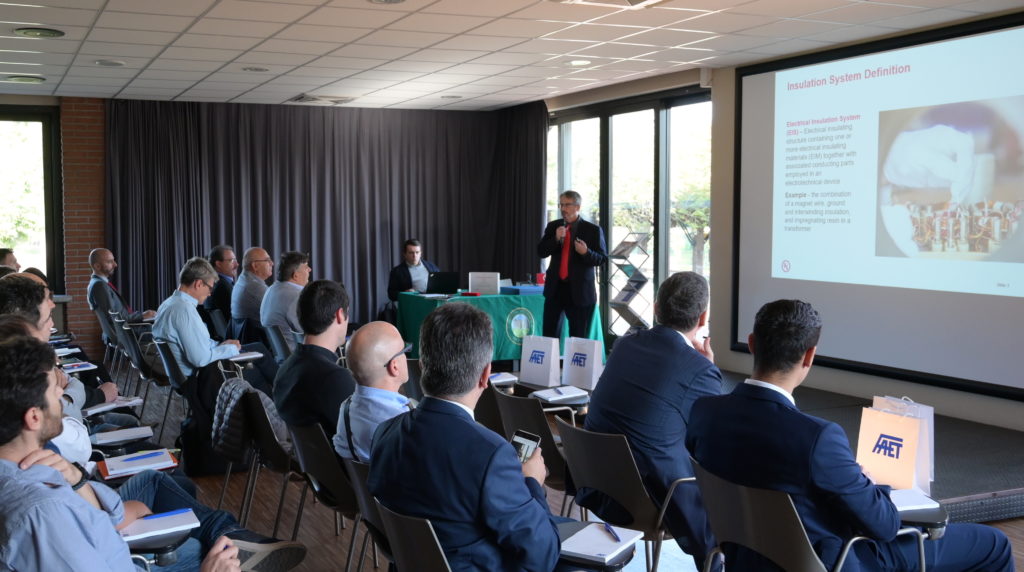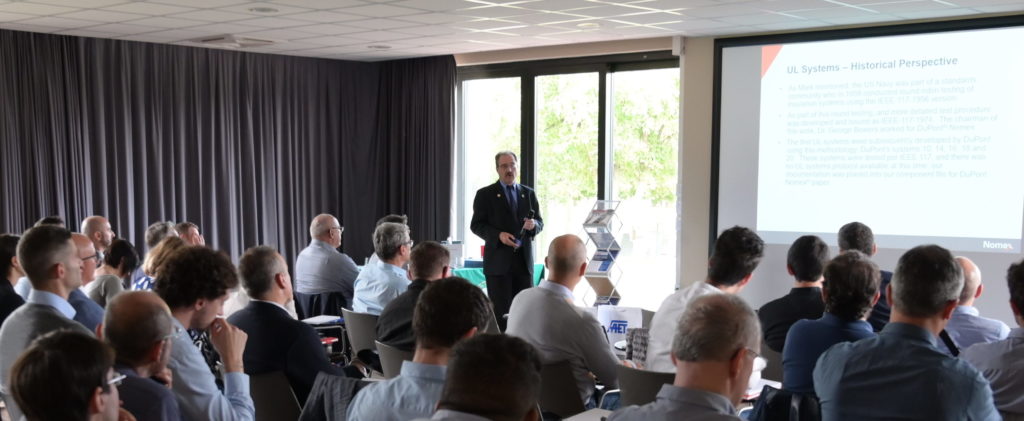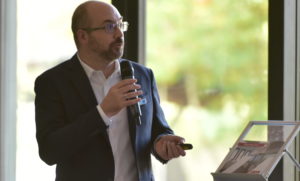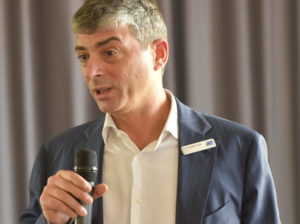Great success for the first recent transition flight test of Prosperity aero-taxi with vertical take-off by the Chinese company AutoFlight, which has risen to an altitude of 150 metres, reaching a maximum speed of 198 km/h. A transition occurs when a plane moves from a vertical to a horizontal motion and it is one of the most committing parts for an eVTOL.
The vertical test flight of the Prosperity I concept has needed eight rotors to lift the 1,500 kg of the electric aircraft into the air. Once the plane has reached an altitude of 150 metres and the relative speed of 160-170 km/h, the fixed-wing part of the eVTOL has generated a lift. In this stage, Prosperity I has entered the transition phase: top rotors have stopped turning and are blocked in an aerodynamic position whereas rear propellers have pushed the aircraft forward as a conventional fixed-wing aircraft.
However, let us go back to the plane: Prosperity I is an innovative eVTOL with declared autonomy of 250 km at a maximum cruise speed of 200 km/h. The design is lift & cruise, with the passenger pod surmounted by a pair of big wings, equipped with long propulsion pods.
AutoFlight hopes to obtain the certification with both the Chinese CAAC and with the European EASA within 2025 to perform the function it has been designed for: short transfers among city zones, transfers to the airport and connections between two neighbouring cities, so avoiding the road traffic. It is estimated that a travel taking hours by car will be reduced to about 10 minutes with eVTOL, without being less safe or more expensive than a taxi ride.
The aero-taxi by AutoFlight has passed the first transition test
Testing facilities: innovation in UK
MAHLE Powertrain has announced the completion of two new facilities in Northampton, the result of a £15m (US$18m) investment over the last five years.
The purpose-built facilities allow MAHLE Powertrain to support customers with the development of decarbonized propulsion technologies, with a focus on mobility, safe testing of vehicles, batteries, and hydrogen technologies under extreme simulated environmental conditions.
The center was declared open for business by Andrew Lewer, MP for Northampton South.
«We’re extremely proud of our new test facilities which complement our end-to-end development process – said Simon Reader, MAHLE Powertrain’s managing director – As the industry accelerates the development of a new generation of vehicles that will offer carbon-neutral solutions for the transport sector, it creates a huge demand for testing facilities. Our new center has been designed with both battery and future-fuelled vehicles in mind and provides a spread of capabilities that is almost unique anywhere in the world».
The new Vehicle Development Centre (VDC) allows manufacturers to test both two and four-wheel-drive vehicles in a variety of conditions and circumstances, without international travel. The facility can replicate the conditions of arctic climates, deserts, tropical rainforests and mountainous regions. The facility also supports the testing of hydrogen-fuelled technologies by monitoring and safely venting any escaping gases.
Andrew Lewer, MP for Northampton South, said: «I’m delighted to be able to declare this important new facility open for business. MAHLE Powertrain’s investment recognizes the huge wealth of engineering talent in this country, and this region in particular – a stone’s throw from the heart of British motorsport – with 160 skilled technicians and engineers already employed at the site».
Aerospace: solutions for tests on electric motors
One of the most critical aspects for electric or hybrid aircrafts, deemed by many people the main future means of transport, are the high safety and redundancy standards they must conform to. Concerning the certification, Easa (European Aviation Safety Agency) is working at a new specific regulatory framework for this type of aircrafts, while FAA (Federal Aviation Administration of United States) has decided adapting the certification procedures of small airplanes to eVTOL.
Therefore, this might lead to satisfy different requisites, with the possibility of having to obtain a double certification, in other words an eVTOL project developed in one of the two continents can need substantial modifications and additional validations to be compliant in the other.
For specific applications, HBK relies on solutions such as eDrive, a platform of power and data acquisition analysis for the execution of innovative tests on electric motors. eDrive consists of two components: a power analysis device and a data collection system, which detects in synchronous modality electric signals, torque, speed, temperature, acceleration, CAN bus signals and other variables.
Moreover, the possibility offered by the system of storing raw data allows the user to analyse the data in post process, using complex functions equipping the software. eDrive Testing offers then unique functions compared to standard power analysis devices and can be used also with multi-phase and multi-channel applications.
Testing of electric vehicles: the new centre of Emitech Group
Emitech Group has just bought the French technical centre of Vitesco Technologies situated in Osny town. This new test centre enhances testing performances of Emitech Group, especially the validation of all vehicle technologies and more specifically of its powertrain group.
With an electric power of 2×800 kVA, a laboratory environment taking up over 1000 sq. m. and an overall area of 6000 sq. m., Osny site is an ideal base for the development of batteries and electric motor activities inside the Group.
The structures host 3 test benches of motors, climatic chamber, roll test bench. This acquisition represents a starting point in the forefront testing course: Emitech Group is investing several million Euros to assure the development of testing structures to test batteries, electric motors and their electronic control systems, as well as hydrogen power supply technologies.
All these competences and the long expertise gained essentially address the automotive industry but they extend to all road vehicles, as well as railway, maritime, energy and aeronautical sectors.
Volvo invests in a new laboratory in Shanghai
To design and to manufacture in-house electric motors for the next car generation, Volvo Cars has inaugurated in Shanghai, in China, a new laboratory precisely dedicated to electric propulsion systems. This structure, in operation since last month, joins the unit that constantly develops electric motors in Gothenburg, Sweden, and modern laboratories for batteries in China and Sweden.
«Through in-house design and development processes, we will be able to perfect our electric motors, reaching higher and higher qualitative levels. Constantly ameliorating the overall performance levels of propulsion systems in terms of energy efficiency and comfort, we create an electric drive experience that exclusively identifies Volvo brand» – stated Henrik Green, Chief Technology Officer of Volvo Cars.
The laboratory activity will focus on the development of electric motors for applications in purely electric and hybrid cars based on the modular architecture for SPA 2 vehicles. The future of the brand is well outlined: the target is rising to 50% the share of fully electric models out of the total of global sales by 2025, with the remaining part constituted by hybrid models.
Good news about fast recharge
State-of-the-art columns for fast recharge, developed by Nidec ASI are ready. Some days ago, the Italian company delivered the University Federico II in Naples the first Ultra Fast Charger column for electric cars that minimizes the impact on the electric net, a test aimed at assessing the technology validity for the widespread diffusion on the territory under various conditions, also in compatibility with photovoltaic systems.
The Ultra Fast Charger is entrusted with the task of simplifying and speeding up the electrification process of infrastructures and of decreasing operational costs to recharge electric vehicles: the presence of 160 kWh internal batteries allows not drawing directly from the network, so avoiding power peaks and consequent blackouts. Despite an energy requirement of just 50 kW, it allows supplying the vehicle with 320 kW power, achieving 80% of the capacity in less than 15 minutes.
Electric cruise motors under testing for NASA’s first all-electric X-plane
An important step forward for the X-57 Maxwell, NASA’s first all-electric X-plane.
Several rounds of tests, high power, and endurance testing are undertaken at Empirical Systems Aerospace, or ESAero, of San Luis Obispo – California, to verify that the electric cruise motors are ready before they are installed in the X-57 vehicle itself.
X-57, modified from a Tecnam P2006T airplane, is currently in its first of three configurations as an all-electric aircraft, called Modification II, or Mod II.
Only at last phase 12 smaller high-lift motors along the wing’s leading edge will be ready to be activated during takeoff and landing.
All three mods of X-57 will utilize the same cruise motors and these verification and validation steps are to reduce risks and increase the safety and reliability of the components on the vehicle.
The results from cruise motor functionality acceptance and qualification tests will help in the effort to set airworthiness standards for electric aircraft.
HBM digital torque transducer
With electric motors and drives now operating at significantly higher speeds, electromobility testing poses a greater challenge for engineers working on R&D or production lines. To overcome this challenge, measurement specialist, HBM has launched the T40B torque sensor which delivers greatly increased revolutions per minute for a selection of measuring ranges of 1, 2, and 3 kNm – up to 23.000 rpm – making it ideal for many types of applications including test benches, end-of-line tests (EoL) and process monitoring.
The T40B torque provides users with precise, reliable measurements first time, eliminating the risk of errors and the need for repeat tests, which can be costly and time consuming.
The sensor has an integrated, magnetic rotational speed measuring system, enabling automotive engineers to test the efficiency of the drive train with a range of motor vehicles. It also operates with analog or digital interfaces making it compatible with different types of test bench systems.
UL certification of insulation systems: inaugurated FAET Italian laboratory
Last October 3rd, in the prestigious venue of Golf Club at Tolcinasco (Milan), was held the first workshop signed by FAET, a meeting aimed at establishing a connection among the OEM world companies interested in the UL certification of the components for insulation systems equipping electric motors.

Spotlights were cast on the new FAET laboratory, on Third Party Test Data Program and on all related advantages for sector players, an ambit that is calling for higher and higher performances. As DuPont perfectly knows, company that during the meeting reported various case histories (by Roger C. Wicks, Global Technical Marketing Manager), as well as UL that, through the speech by the American Mark Raymond, one of the major experts in insulation systems in the world, illustrated the highlights of the specific Sealed Tube Chemical Compatibility Testing.

Since today, in the up-to-date structure at Rozzano (Mi), FAET can in fact test whether the mix of the various components inside the insulation system is appropriate and then it can achieve the UL certification.

The details of the accomplishment of this important partnership were finally explained by Silvio Cattinzoli, Quality System & Technical Manager of FAET, who underlined how it is strategic to supply, in the whole Mediterranean basin, an added-value service to customers that so benefit from not being compelled to directly interfacing with UL.

«We are speeding up an important phase for FAET and UL, in the name of insulation systems’ safety. We hope this workshop is the first of a long series because companies increasingly need information, dialogue and aggregation» – the Ceo and owner of FAET, Gabriele Guidi, stated at the event start.
Testing e-trucks in Europe?
Waberer’s (vehicle operator in international full truckload transportation in Europe) is willing to test and is open to participate in the introduction of Tesla’s e-trucks in Europe.
Also, as the firsts from Europe, Waberer’s tested the Tesla Semi e-truck designed for long-distance transportation.
Waberer’s and Paccar Group (supplier of Daf trucks) are discussing the testing and introduction of electric and driverless vehicles under development.
“We at Waberer’s are committed to continuous innovation and seize every opportunity participate in our partners’ R&D and innovation programs. Electric and driverless truck developments may significantly reduce the environmental impact of road transportation and have a favourable effect on the cost side at the same time. We see a great opportunity in developments concerning logistic infrastructure. In fact, we have effectively implemented several digital innovations in our operations”, said Ferenc Lajkó, Ceo of Waberer’s.










